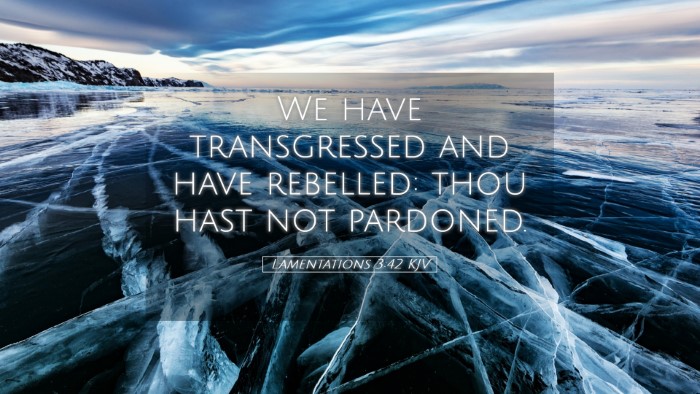Lamentations 3:42 - Commentary Summary
Lamentations 3:42 states: "We have transgressed and have rebelled; You have not pardoned." This verse
captures the essence of human sinfulness and the deep sense of remorse that follows the recognition of
one’s own disobedience to God. The book of Lamentations, attributed to the prophet Jeremiah, is a profound
meditation on the consequences of sin and the suffering that follows national calamity.
Contextual Understanding
In this chapter, the author reflects on the collective suffering of the people of Israel following the
destruction of Jerusalem. The anguish expressed in Lamentations is not merely personal but also national,
pointing to a community that has collectively faltered in its covenantal relationship with God.
Therefore, this verse serves as a confession not just of individual sins but of corporate failures.
Theological Insights
-
Transgression and Rebellion:
The terms "transgressed" and "rebelled" emphasize the active choice of sin against God. Matthew
Henry notes that these are not mere mistakes but deliberate acts of turning away from God's will.
Such language paints a solemn picture of humanity in its fallen state, recognizing the covenant
obligations owed to God.
-
The Nature of God’s Justice:
The acknowledgment of not being pardoned reveals the seriousness of sin before a holy God. Adam Clarke
points out that while God is merciful, He is also just. The refusal to pardon speaks to the necessity
of divine justice in the face of rebellion. This duality of God’s nature calls believers to understand
the weight of their sins and the consequent need for repentance.
-
Corporate Responsibility:
The collective language used highlights the importance of community in the narrative of faith.
Albert Barnes emphasizes that this collective acknowledgment of sin invites communal penitence—the
idea that the nation must recognize and repent for its sins together. This has implications for
corporate worship and the church's role in seeking national repentance today.
-
Hope Amidst Despair:
Despite the somber tone, the broader context of Lamentations reveals that recognition of sin can lead
to repentance and ultimately to hope. Matthew Henry reminds us that although the cry of lamentation
presents a dire situation, it is in acknowledging our sinfulness that we can begin to grasp the
depth of God’s mercy and the possibility for restoration.
Application for Today’s Believers
As modern believers engage with Lamentations 3:42, several applications arise:
-
Personal Reflection:
Individuals are called to self-examine their lives, acknowledging areas of transgression and rebellion
against God. This verse serves as a catalyst for personal confession and a deeper understanding of the
need for God’s grace.
-
Corporate Worship and Repentance:
Churches should embrace communal lament and repentance, taking time not only to celebrate God's
goodness but also to acknowledge the collective failures that may be affecting the church and society.
Barnes encourages congregations to incorporate prayers of confession and lament into their services.
-
Balanced View of Grace and Justice:
The interplay between grace and justice is crucial for theological education. Clarke highlights the
importance of teaching both the depths of human depravity and the heights of God's mercy, enabling
believers to appreciate fully the gift of salvation through Jesus Christ.
-
Hopeful Anticipation of Restoration:
The acknowledgment of sin should not lead to despair but to a hopeful anticipation of restoration in
Christ. The lament in Lamentations ultimately points to the need for a Savior, reminding believers
that through repentance comes renewal and grace.
Conclusion
Lamentations 3:42 serves as a poignant reminder of the gravity of sin and the dire need for God’s
intervention through grace. It calls both individuals and communities to a place of reflective sorrow
that can lead to genuine repentance. In a world that often overlooks or minimizes the seriousness of
transgression, this verse stands as a powerful call to recognize our failures before God and to lean
into His unending mercy.


